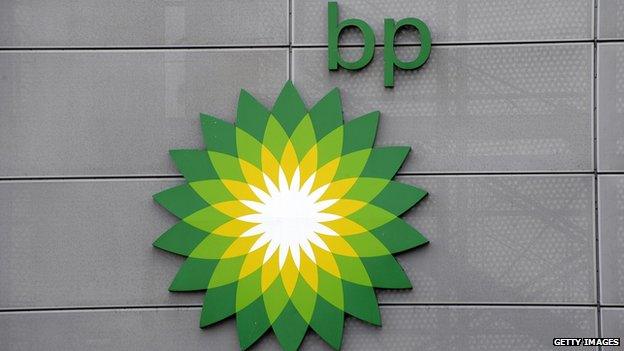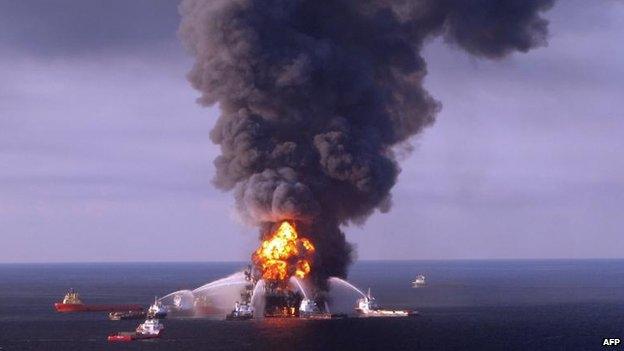BP - this is not just about the oil price
- Published
- comments

In the heady days of annual profits well north of £15bn, BP used to account for £1 of every £6 paid out in dividends by FTSE 100 companies to our pension funds.
Its profits in the final quarter of 2011 were £5bn. Compare that to today's figure of £1.5bn for the equivalent period in 2014.
Three factors account for BP's loss of momentum.
And all of them could well be long term.
Firstly, the oil price.
As Bob Dudley, BP's chief executive, told me at the World Economic Forum at Davos, the oil major expects the oil price to remain low for up to three years.
Now, that may be a little pessimistic. The price of Brent crude has been creeping up over the last week and American production of shale oil is being cut, which will tighten supply.
But Mr Dudley is making the "low price for a long time" argument for a reason.
He wants to push BP on costs, demanding that it becomes an oil major fashioned for an oil price between $50 and $100 a barrel rather than one only comfortable when oil is over $100 a barrel.
The fourth quarter results announced today certainly reveal the impact of the low oil price.
Impairment costs - that's the reduction in the value of the company's assets such as oil reserves - total £4.3bn before tax.
And of that, the largest proportion is associated with the North Sea, both UK and Norway.
Which must raise fresh concerns about the cost of doing business in that mature field.
The second reason for BP's lower profits is Russia, where sanctions and the precipitous decline of the rouble have meant lower returns from BP's stake in Rosneft.
Underlying income from the Russian oil giant to BP came in at £312m, compared with £730m for the same period a year ago.
Of course, Russia is also being affected by the low oil price.
As well as the diplomatic and economic fallout from its Ukrainian adventures.

The fine for the pollution caused by the Deepwater Horizon disaster could top £9bn
The third big problem for BP is the aftermath of the Deepwater Horizon disaster.
This April will be the fifth anniversary of the tragedy which killed 11 oil workers and led to millions of barrels of oil leaking into the Gulf of Mexico.
In its results, BP said it would increase provisions for the disaster by £317m, taking the total liability provision to £29bn.
Mr Dudley says that figure is on a par with the total insured losses from Hurricane Katrina.
The third, and final, legal case against BP has just wrapped up in New Orleans. BP is now waiting to hear the size of the fines imposed on it for the pollution in the Gulf.
It has provisioned £2.5bn. The fine, which is unlikely to be announced any time soon, could be as high as £9.1bn.
The results of these three strong headwinds is that BP is cutting operational costs and capital expenditure, the latter by as much as £4bn.
And that means difficult decisions for "marginal" areas.
Which many believe means the North Sea.
George Osborne, who has suggested that tax incentives for the sector will be announced in the March Budget, will be watching closely.